
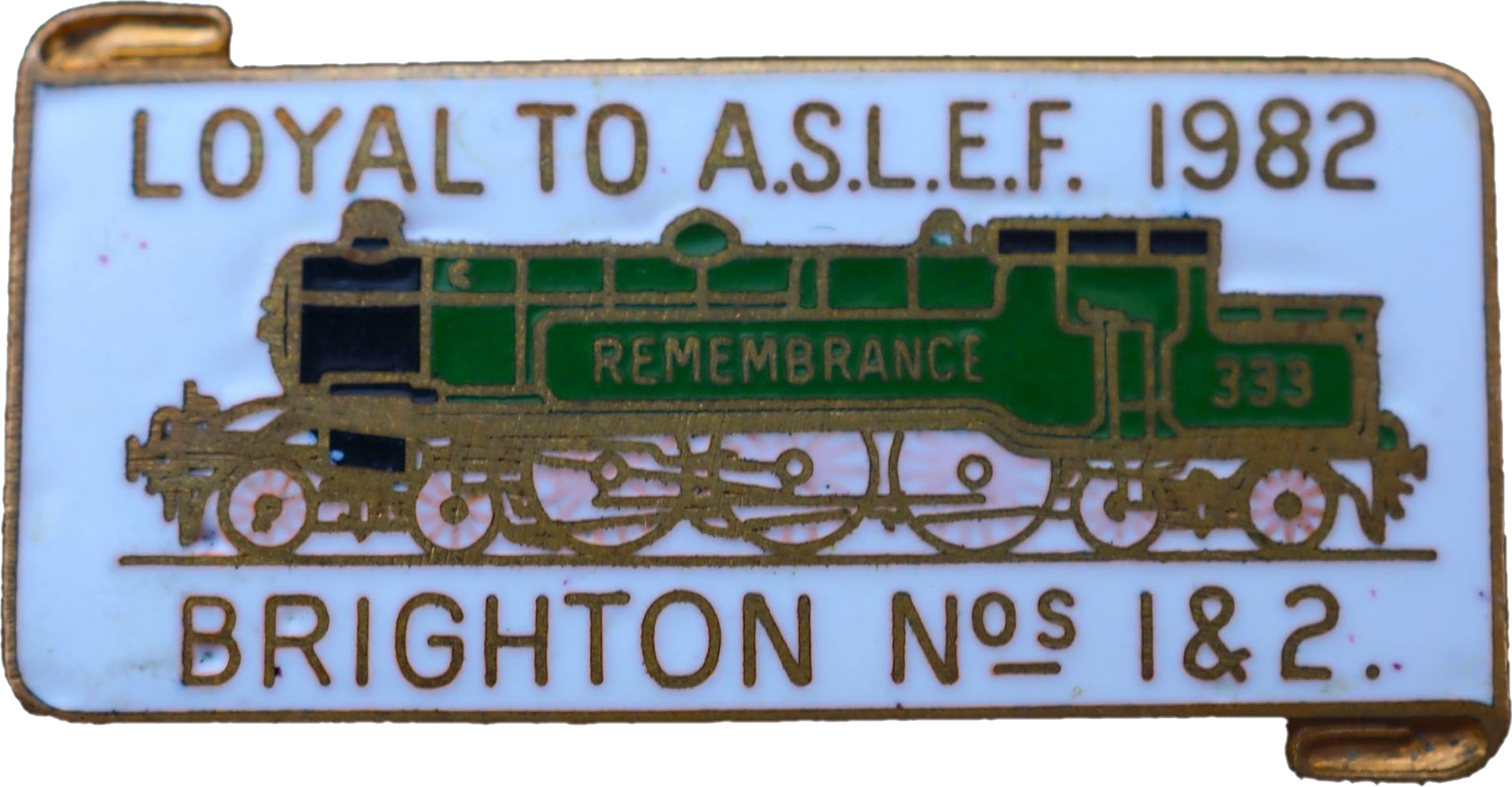
ALLAN PENTENY COLLECTION
The Joint Brighton Branch Strike Badge designed by
Alan Ricketts and Jim Sayers
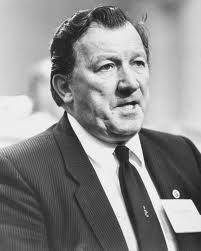
ASLEF COLLECTION
ASLEF General Secretary Ray Buckton 1970 ~ 1987
"I can't hold my members back any longer”
was Ray Buckton's favourite and ominous quote
during spells of industrial strife on the railways.
Extracted and adapted from
Tunbridge Wells Special Meeting
Sunday 10th January 1982, 10.10 a.m.
at the Welfare Rooms Tunbridge Wells Central Station
INDUSTRIAL DISPUTE CALLED BY HEAD OFFICE
This meeting was called to inform all members of the branch the reasons for the E.C. calling the two days strikes plus the overtime ban. The Chairman then handed over to Bro. M. Allen for an explanation to the dispute.
Bro. M. Allen then gave a history of the productivity and the discussion held between the B.R.B. and the unions. He outlined that this had been going on since 1979, and was over the paper plan for the 1980’s submitted by Management and over the paper submitted by the N.U.R. The main points that Bro. M. Allen brought to the members attention were passenger business i.e. poor standards of cleaners and time keeping, operation of manning of trains and the flexible hours which at this time was anything between 7 to 9 hours shifts and if this was brought into action this would mean a lost of work where work would have been tighten up between depots also loss of P.N. Breaks these would be altered, no drivers on Merry-Go-Around trains, rostering over 7 days, failure to attend work would mean heavy financial loss – something like the P. Way have excepted. After some debate between members it was then three motions were drawn up and voted on. At this time two members did leave, they were Bros. P. Pepper and S. Neal.
Motion No.1
That Tunbridge Wells agrees with the E.C. that we oppose the 7 to 9 hour rostering and that this action should be taken further and no overtime be worked – no rest day and no Sundays.
Moved by Bro. J. Carney and seconded by Bro. M. Allen.
Voting For 3 Against 0 & Abstantion 1
Motion No.2
That Tunbridge Wells to inform the E.C. that if any other depots work overtimne including Sundays, that this depot will work overtime.
Moved by Bro. R. MacDonald and seconded by Bro. G. Ellard
Voting For 4 Against 0 Abstantion 0
Motion No. 3
That Tunbridge Wells feel that the E.C. should not call an all out strike because it is doubtful if we would win the issue.
Moved by Bro. M. allen and seconded by Bro. G. Ellard.
Voting For 3 Against 0 Abstantion 0
After this no further motion came forward and as no other discussion started the Vice Chairman thanked all for coming and closed the meeting at 12.08.
Train Driver Bob Clark signed in for work at 3.22 a week last Tuesday afternoon.
As he walked into the shabby mess room at West Croydon depot there was a leaflet from British Rail waiting for him.
It extolled the advantages of flexible rostering to a man who’d just left Southampton at quarter to one that afternoon and was not expecting to get back there until half past one the following morning.
For Bob - who drives train around the most densely worked railway system in Europe - is already doing flexible rostering.
And it’s the attempt by British Rail to impose even worse conditions on men like him which has led to such resistance from A.S.L.E.&F. drivers and the present dispute.
“ If they try to bring it in against the will of the men on the Southern Region I tell you there won’t be any drivers left,” he says. “ We’d resign en masse.”
Threats not idly made by such a proud and craft conscious group of workers.
For each driver the day begins with his diagram (work schedule). B.R. allows them ten minutes to pursue them and any other information they need - like details of repair work on the lines - before they start.
Today Bob is taking the 15.54 to Holburn Viaduct. Stopping and starting all the way like a production line. He calls the Southern suburban region ‘London’s underground’.
But although it’s the most worked area in the country it’s also the most under-invested. Suffering ironically from too much too soon.
It was electrified back in the ‘20s and ‘30s by the old private companies. As a result all the trains are single manned. There are few trainees and consequently drivers come from far afield to work here.
In West Croydon alone men travel to work from places like Brighton and Milton Keynes.
Most of the rolling stock they drive is antiquated. Dating back to 1951 and 1963. All the trains Bob drives today are the ’51 vintage. On Monday he was even driving one built in 1936!
The trains are uncomfortable and draughty. Bob compares them unfavourably with the working conditions of B.R. staff in their plush new office blocks being built al over the country.
Seventy five percent of trains on the Southern Region don’t have speedometers.
So how can you tell how fast you’re going?
“ You just look out of the window and try and judge it from how fast things go by,” he says.
At least the trains aren’t as old as the signal system. fifty percent of signals on the Southern Region are of the old semaphore variety dating back to when the railways were first built. So they don’t have any automatic warning system. The drivers MUST see them.
So with the lights green and after the guard has given the go-ahead from the back of the train Bob eases the train out towards Holborn Viaduct - eleven stations and many more vital signals away.
The driver’s cab is warm but cramped. Bob prefers not sit on the seat - it’s too hard. Instead he stands with his hand permanently pressed on the ‘deadman’s handle’ keeping an eye out all the timer signals.
Unlike most small boys Bob never wanted to be a train driver. Born in and brought up in Paisley Scotland he was involved in a tram crash while a baby and it put him off trains.
But after school and a catering career fell through he joined the railways as a guard in Glasgow.
After talking to drivers during his breaks he decided he wanted to become one too but since there were no vacancies in Glasgow came down south to Kings Cross to train.
He spent a year at Eastleigh - (near Southampton) - “ I used to kid the drivers there it was to get away from Kings Cross, I told them it was the original red depot!
Then after six months intensive training course and a period of ‘learning the road’ he qualified just over a year ago.
Although he’s settled down in Southampton there were no jobs going at Eastleigh she came up to West Croydon commuting every day.
“ So I know what it’s like being a passenger as well,” he says.
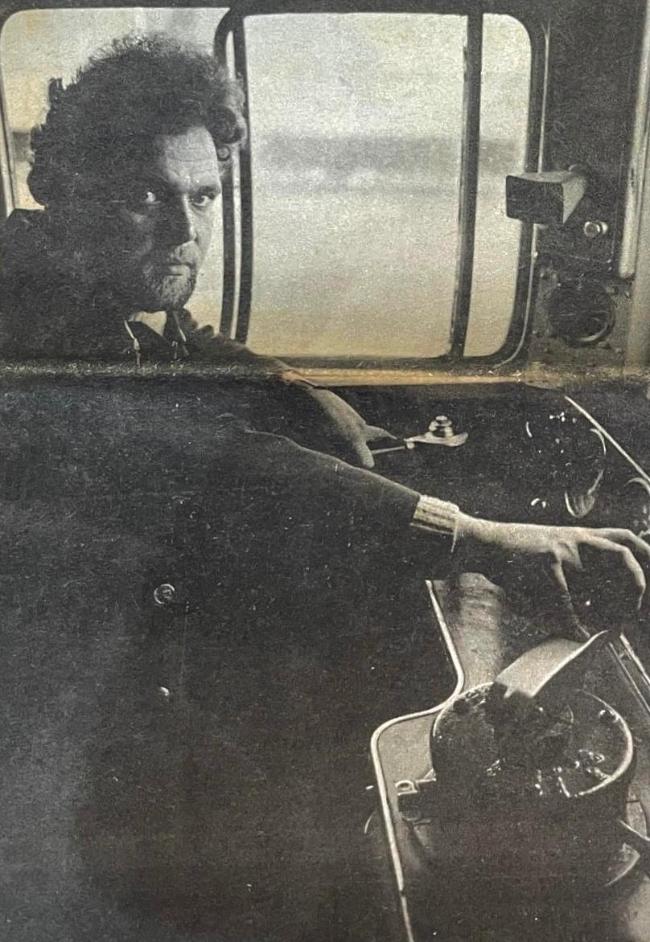
Bob likes working Southern Region because, he says, the relationship between management and the men is good. “ There’s nobody looking over your shoulder and telling you what to do.”
But this good relationship he feels will be jeopardised by the present dispute.
The feelings among both guards and drivers against B.R. is running high. At every changeover the only topic of conversation is the dispute and the hated flexible rostering. Resentment against British Rail - and the government - is universal.
“ It’s the Tories pulling the strings. They’ve beaten every other union and now they’re after A.S.L.E.&F.” said another driver to Bob.
“ The British Rail Board would never taken us on otherwise. I don’t think Peter Parker could wipe his arse on his own.”
Extracted and adapted from
Tunbridge Wells Special Meeting
Sunday 10th January 1982, 10.10 a.m.
at the Welfare Rooms Tunbridge Wells Central Station
INDUSTRIAL DISPUTE CALLED BY HEAD OFFICE
This meeting was called to inform all members of the branch the reasons for the E.C. calling the two days strikes plus the overtime ban. The Chairman then handed over to Bro. M. Allen for an explanation to the dispute.
Bro. M. Allen then gave a history of the productivity and the discussion held between the B.R.B. and the unions. He outlined that this had been going on since 1979, and was over the paper plan for the 1980’s submitted by Management and over the paper submitted by the N.U.R. The main points that Bro. M. Allen brought to the members attention were passenger business i.e. poor standards of cleaners and time keeping, operation of manning of trains and the flexible hours which at this time was anything between 7 to 9 hours shifts and if this was brought into action this would mean a lost of work where work would have been tighten up between depots also loss of P.N. Breaks these would be altered, no drivers on Merry-Go-Around trains, rostering over 7 days, failure to attend work would mean heavy financial loss – something like the P. Way have excepted. After some debate between members it was then three motions were drawn up and voted on. At this time two members did leave, they were Bros. P. Pepper and S. Neal.
Motion No.1
That Tunbridge Wells agrees with the E.C. that we oppose the 7 to 9 hour rostering and that this action should be taken further and no overtime be worked – no rest day and no Sundays.
Moved by Bro. J. Carney and seconded by Bro. M. Allen.
Voting For 3 Against 0 & Abstantion 1
Motion No.2
That Tunbridge Wells to inform the E.C. that if any other depots work overtimne including Sundays, that this depot will work overtime.
Moved by Bro. R. MacDonald and seconded by Bro. G. Ellard
Voting For 4 Against 0 Abstantion 0
Motion No. 3
That Tunbridge Wells feel that the E.C. should not call an all out strike because it is doubtful if we would win the issue.
Moved by Bro. M. allen and seconded by Bro. G. Ellard.
Voting For 3 Against 0 Abstantion 0
After this no further motion came forward and as no other discussion started the Vice Chairman thanked all for coming and closed the meeting at 12.08.
Tunbridge Wells Meeting
Sunday 21st February 1982, 10.15 a.m.
at the Welfare Rooms Tunbridge Wells Central Station
The Chairman that he had received a letter from the Tunbridge Wells Trade Council. It went on to say that they do give A.S.L.E.F. full support in the fight for the 3%. It was then mentioned by Bro. M. Allen that we all knew what the B.R.B. were trying to do, but thanked the Trades Council for their support by asking the members to all instruct the Secretary to write back to the Trade Council and thanked them for their letter and their support and to point out that we see what was happening also to apologise for not sending any member along for their meetings.
Moved by Bro. M. Allen and seconded by Bro. F. Diplock.
"That this branch instructs the Secretary to write to the Tunbridge Wells Trade Council and thank them for their support during our industrial action."
All in favour. Carried.
Bro. Allen then finished his L.D.C. report and then asked if he could put forward a motion over the successful conclusion of the ending of our six week long strike. It was then moved by Bro. M. Allen and seconded by Bro. R. Harris.
“That this branch congratulate the Executive Committee and the General Secretary on a successful result from the industrial action, in that against all odds, the B.R.B. government, press and the public opposition and the poor support shown by other other rail unions. The A.S.L.E.F. have succeeded in bringing about what was right.3% rise as part of the 1981 pay settlement and the right to have all items of productivity as proposed by B.R. discussed in the proper machinery of negotiation for rail staff.
The method of instituting the industrial action be applauded and the timing of the hardship fund be considered just right.
The officers of the Society, Head Office Staff and other involved in helping our case succeeded be given our sincere thanks, however this branch urges the utmost caution in respect of forthcoming negotiations.
The B.R.B. given the opportunity will no doubt try to introduce items of productivity will no doubt try to introduce items of productivity in numbers and try through all stages of the machinery including the R.S.N.T. to get such items implemented.
Remembering the commitment given in the understanding on pay, by A.S.L.E.F. on variation to the 8 hour day and the commitment by the Society’s members to retaining the principle of the 8 hour day and no worsening of condition of service.
The Executive Committee should be seen in others eyes to be making progress on some productivity items while retaining the principles of the Society.
For should the Society’s representatives seen inflexible on all productivity items and such arbitration be awarded against A.S.L.E.F., only B.R. proposals having been discussed, then such pressure on us by outside influences will surely cause great concern.
The Society’s representatives must be imaginative with counter proposals on productivity to such a degree as to show how low productivity is in other grades and how all grades should contribute. Show what positive proposals by the Society on some items have been put to counter management proposals and of course why management proposals are unacceptable or unworkable for us.”
All were in favour carried.
The Chairman then went on to the setting up of a hardship fund. It was after some discussion, a motion formulated
That the fund be held by the Branch Secretary an d the Branch Assistant. Moved the motion by Bro. M. Allen and seconded by Bro. C. Exley all were in favour. Carried.
It was then moved by Bro. Harris and seconded by Bro. M. Allen. That a ballot of th men at the depot to give every member the chance to see if they would need the help or not. All in favour.
Bro. C. Exley moved and seconded by Bro. M. Allen.
That the Hardship Fund to be split among those who return the slip of paper back with a yes on it until all the £82.00 has gone. The Secretary when allocating monies be subject to the strictest of confidence. All in favour. Carried.
It was then mentioned to which fund does the denotations kindly given by Bro. H. Love, the feeling of the members was that it should go in the Branch Funds.
The Chairman then asked the Branch Secretary to give a report on Mutual Aid Fund. The Secretary then mentioned that in the Mutual Aid Fund had £68.66 in the account but could not find a list of any members that belonged to this fund and on checking with the minute book, the Secretary could not find any information on this fund after June 1978 and had written to Bro. W. Baldwin on this subject.
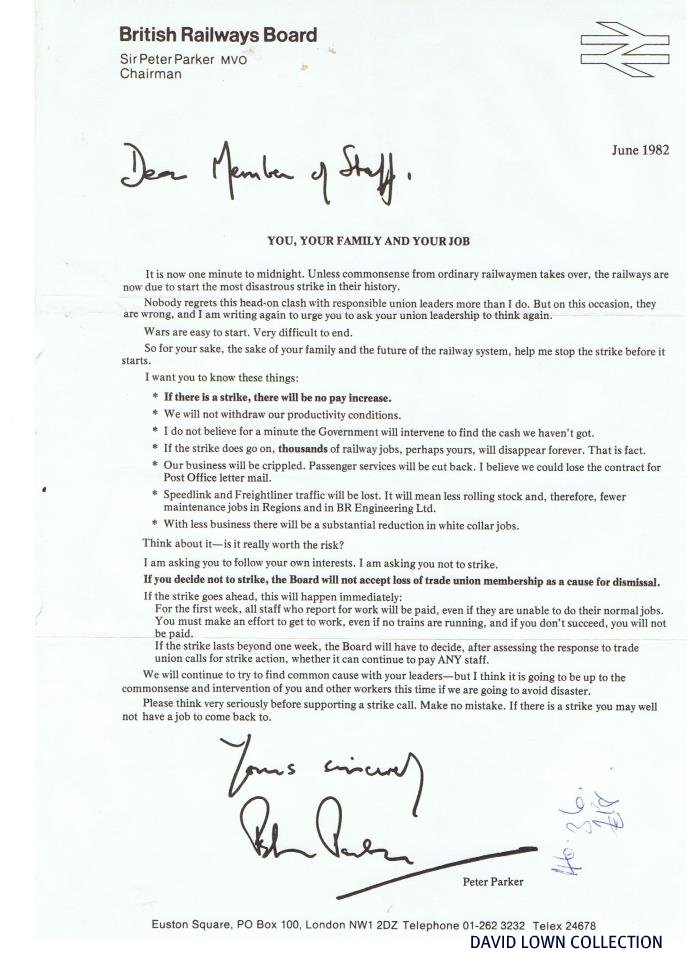
In 1982 was to become a major milestone for A.S.L.E.F. and its membership. British Rail
management wanted to implement flexible rostering which would mean footplate staff
working a variable length day between 7 – 9 hours. The variable day meant doing away with
the guaranteed 8 hour day, which A.S.L.E.F. had achieved after a long struggle back in 1919.
After long and protracted negotiations which also included an overtime ban and also a series
of 24 hour strikes on one day each week this came to nothing as British Rail management
would not move from their stance of ending the guaranteed 8 hour day the A.S.L.E.F.
leadership called for an indefinite strike by all members.
So on Sunday 4th July at one minute past midnight the indefinite strike started. The two
Brighton branches E.M.U.T. and M.T. members became united to play their part in retaining
this much valued condition of service. On Tuesday 6th July in the first week of the strike a
series of special joint branch meetings of members from both branches being invited to attend
were held. These meetings were to keep the membership informed of the latest positions of the
A.S.L.E.F. leadership regarding the strike. This first joint branch meeting instructed that
those A.S.L.E.F. members who where no longer fit for any driving duties to go to work as
normal. These members where medically restricted and were employed to carry out such
duties as railway messengers, mess room cleaners, and non clerical time clerks etc. These
members would turn up at the special joint branch meetings to give details of the events that
were happening with the depot.
As the strike progressed with the vast majority of train services in the country at a stand still
with backing of the then Conservative Government the threat of mass dismissal of all striking
A.S.L.E.F members from British Rail Management was made. This put all A.S.L.E.F. members at
under a great deal of pressure regarding their own future employment. The threat by British
Rail Management to actually go ahead and dismiss the entire work force swayed some
members to break ranks and return to work. Members where concerned not just about losing
their jobs but also the effect on their hard earned pensions as many where nearing their
retirement.At the special joint branch meeting held on Thursday 14th July it was decided that
the next meeting would be held on the following Monday 19th July, this was the day British
Rail Management had threatened to send out the dismissal notices. It was still British Rail
Management’s intention to dismiss all striking A.S.L.E.F. members, if they had not returned back to
work by that date.
Over the following weekend of 17th -18th July national talks where held between British Rail
management and the A.S.L.E.F. leadership, on the evening of Sunday 18th July a press
statement from A.S.L.E.F. Head Office was released informing members to go back to work as
normal from one minute past midnight on Monday 19th July. The A.S.L.E.F. leadership had
decided to call off the strike and had conceded to British Rail managements new rostering
principles of having a variable length day of 7-9 hours and also a reduction in the working
week from 40 to 39 hours. A.S.L.E.F.'s defeat was bushwhacked by the resilient rail board
over "flexible rostering". The T.U.C. even twisted the knife by urging the train drivers to
return to work.
The special joint branch meeting on Monday 19th July still went ahead even though many
A.S.L.E.F. members had adhered to the A.S.L.E.F. leadership instructions and had returned
back to work. At the special joint branch meeting, the members officially call an end to the
strike and it was also agreed that the anger from the Brighton membership was to be
recorded into the way that the strike had been called off and the cherished 8 hour day had
been conceded against the Brighton branches wishes.
At the following Sussex branches, a number of A.S.L.E.&.F. members attended work at some time during the strike
Bognor Branch = 100%
Brighton No.1 Branch = 13 ASLE&F members 5 drivers & 8 secondmen (includes 1 Relief Driver)
Brighton No.2 Branch - 10 ASLE&F members
Eastbourne Branch = 2 ASLE&F & 1 N.U.R
Horsham Branch = 1 ASLE&F member
Littlehampton = 1 ASLE&F member
Ore Branch = 1 ASLE&F member
Seaford (Depot) = 100%
Three Bridges Branch = 1 ASLE&F member
Tunbridge Wells Branch = 5 ASLE&F member
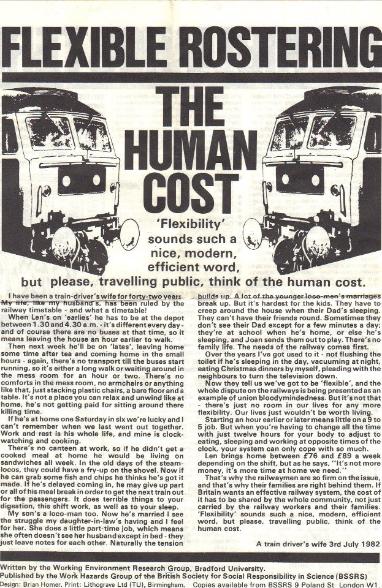
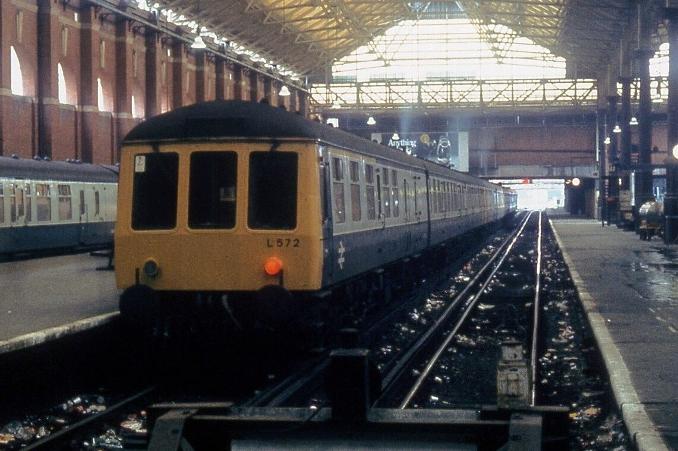
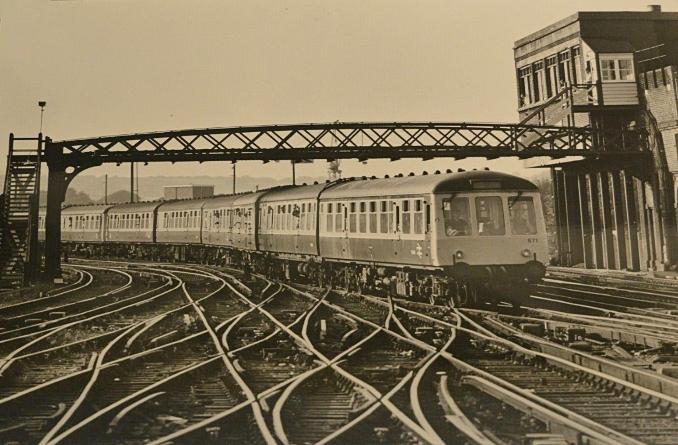
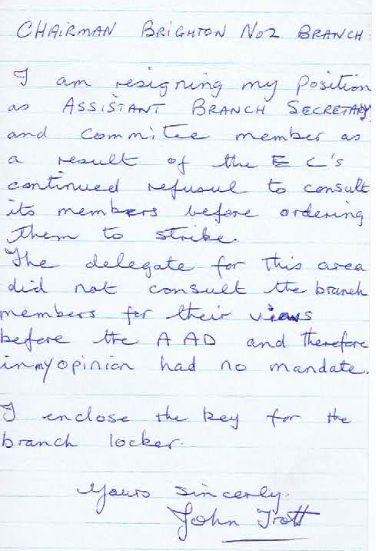
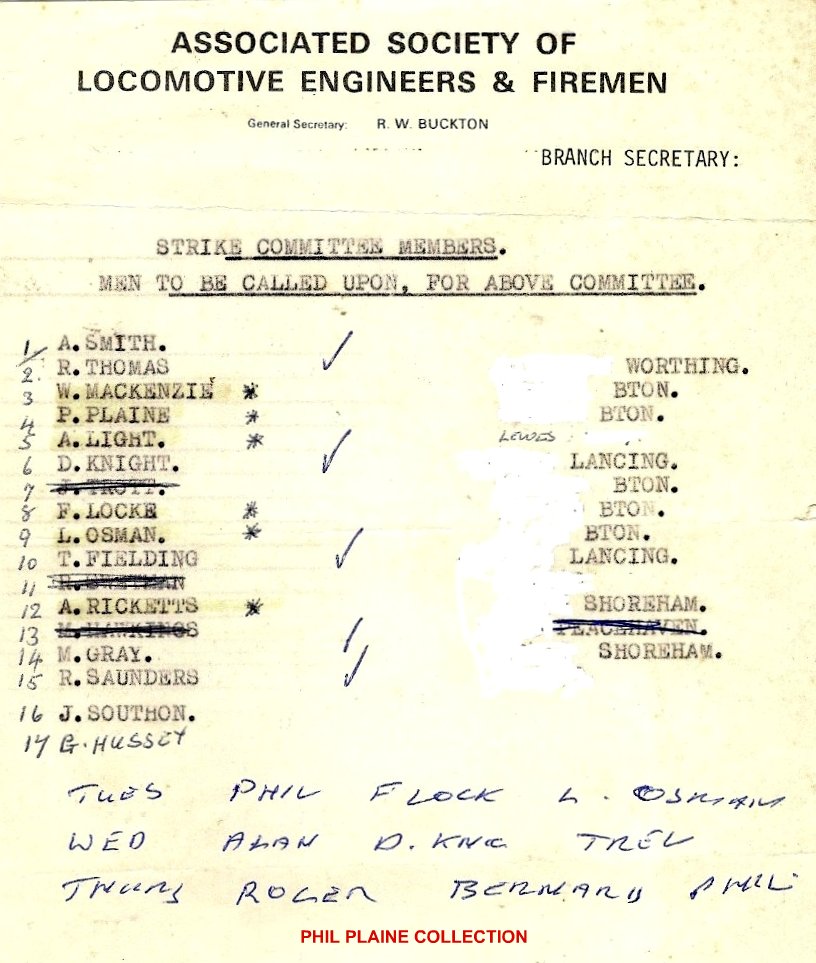
Above the Brighton Joint Branch Strike Committee which incorporating members from all
three depots Brighton M.T.,
Brighton E.M.U.T. & West Worthing E.M.U.T.
Alfie Smith, Roger Thomas, Bill MacKenzie, Phil Plaine, Norman Light, Dave Knight,
John Trott, fred Locke, Laurie Osman, Trevor Fielding, Roy Swtman, Alan Ricketts,
Mick Hawkins, Maurice Gray, Rod Saunders, Jimmy Southon & Graham Hussey.
(Please note the members telephone numbers have been ereased from this document)

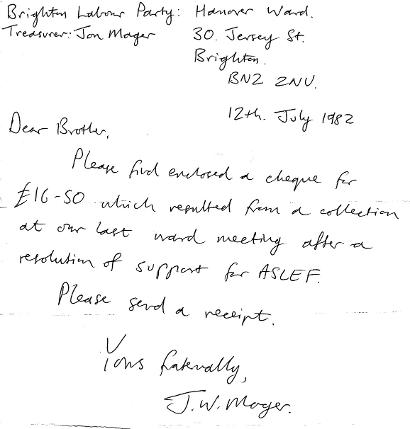
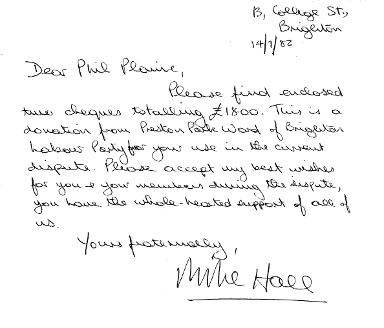
PHIL PLAINE COLLECTION
Support from the Brighton Labour Party
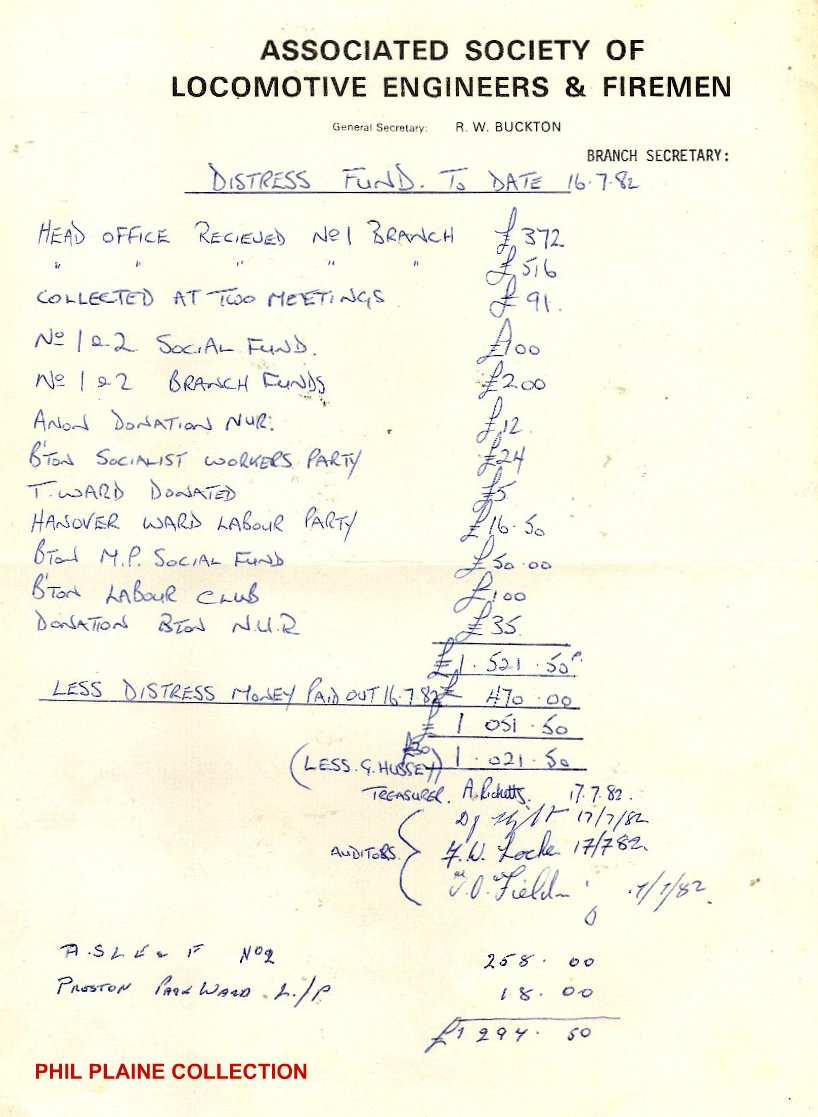
Brighton Joint Branch Distress Funds as of the 16th July 1982.
The T. Ward Donation, relates to a donation from Brighton (No.2) A.S.L.E.F. member
Tommy Ward.
Tom was one of a number of medically A.S.L.E.F. members of the Brighton Joint
Branches, who were instructed to report
for work as normal. Because they could not drive any trains and were designate to non
driving duties around the depot, it was felt by these members working normally that they
would have any implications to the end result of the strike.
At every branch meeting during the strike Tom would reported to the Branch of the latest
activities from within the depots and across the division
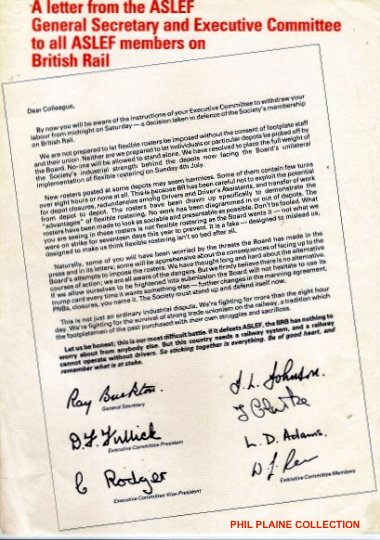
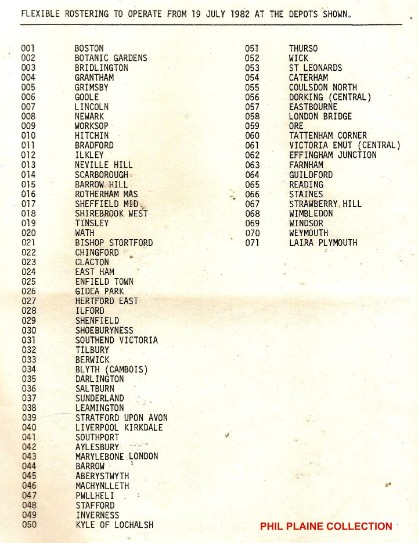
The list of depots that the B.R.B. were going
to have Flexible Rosters imposed upon them

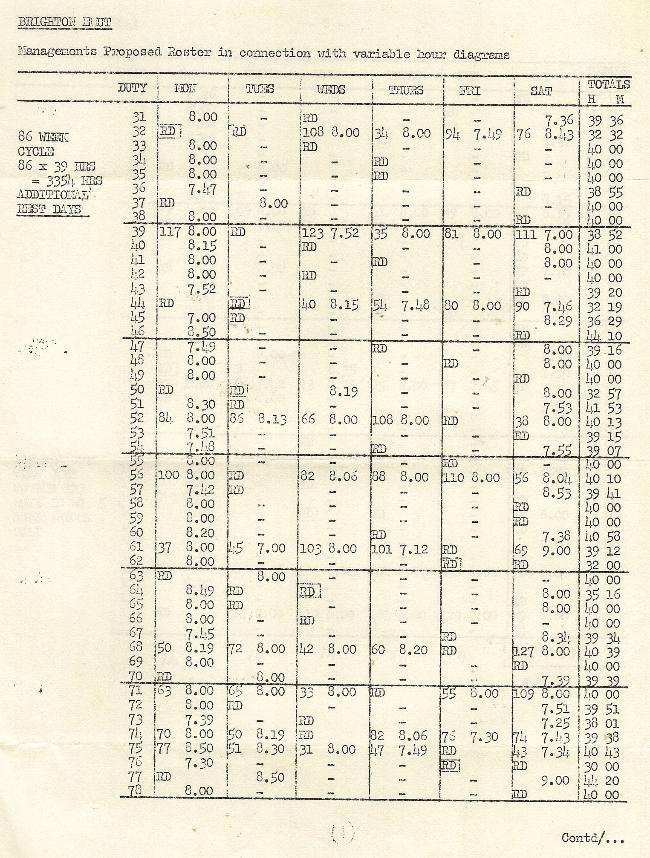
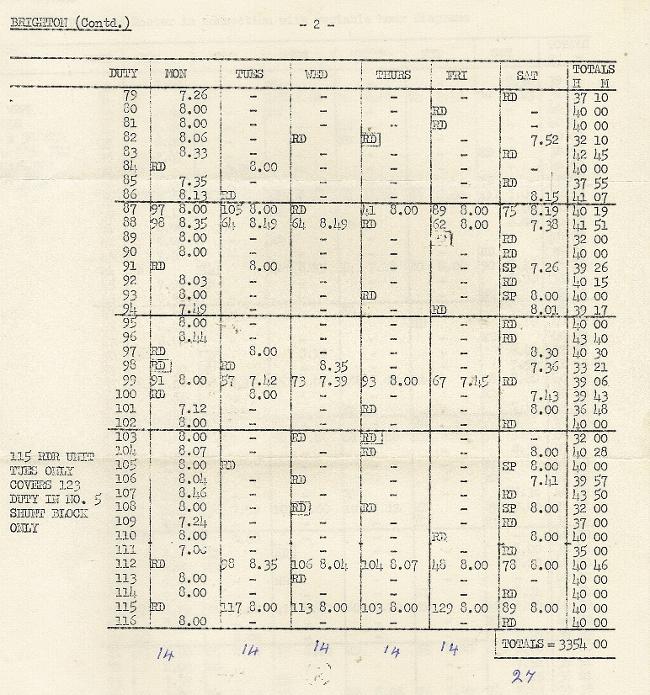
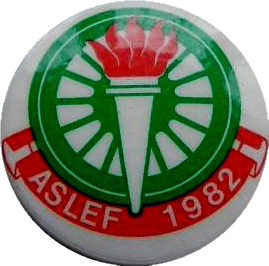
ALAN PENTNEY COLLECTION
The 1982 strike badge produced by ASLEF
This badge is based on the 1955 strike.
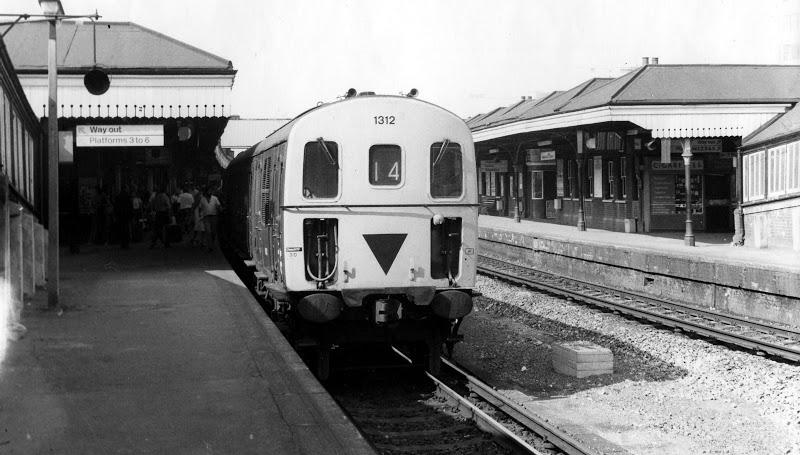
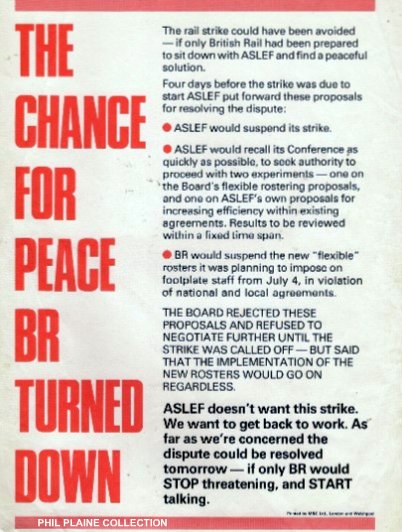
BRIGHTON AND HOVE
DISTRICT TRADE UNION COUNCIL
Dear Sister/Brother,
You are invited to the July meeting of the Trades Union Council on 21st July at the Labour
Club, 16 Lewes Road, Brighton at 7.45 p.m.
A.S.L.E.&F. STRIKE
Bro. Plaine (A.S.L.E.& F. No.2) attending by invitation.
ASLEF DISPUTE
Strike Fund appeal sheet enclosed. Please take to your Branch meeting, workplace etc.
The British Rail Board, backed by the Tories are determined to smash A.S.L.E.&F. If they
succeed it will be your Union next!
Out of 200 A.S.L.E.& F. members in Brighton only one driver and two trainees are reporting
for work!
*extracted from the agenda of the Brighton & Hove Trades Union Council
THE 1982 A.S.L.E. & F. DISPUTE
THE RUN UP AND THE AFTERMATH
by Phil Plaine
This article has been taken from the hand written notes by Phil Plaine, these notes were used
as part of his address to the Brighton Trades Council shortly after the strike ended .
Looking back over the run up to the dispute, which first started with “1980 PAY
SETTLEMENT” and the promise of a one hour reduction in the working week, before we
accepted the 39 hour week. It would have been in our interest to have agreed on how this was
to be implemented, as it happened the British Rail Board used it as a lever to force on us
Flexible Rostering, which was the second item out of nineteen items which they had prepared
on productivity which become known to us as their shopping list.
With the 1981 pay claim in May of that year the B.R.B. offered the unions 7% increase which
was rejected and the claim went to the Railway Staff National Tribunal (R.S.N.T.) with Lord
McCarthy, which found in our favour of 8% immediate + 3% payable in November. This
descision (R.S.N.T. Decision 72) was rejected by the B.R.B. This was first time that happened that a decision at the R.S.N.T. had even been rejected by one of the parties involved. And with a treat of a strike in the August the dispute was taken to A.C.A.S. and a settlement reached on the 8% being paid + 3% in January 1982, but back dated to November 1981, due to a cash flow problem of British Rail. In a seperate agreement at A.C.A.S. it was agreed that the union would discuss certain aspects of productivity, Flexible Rostering being one of the items. It must be stressed that it was agreed to discuss, no commitment being made to reach agreement.
In late December 1981 as the B.R.B. had made no progress with A.S.L.E & F. on Flexible
Rostering they informed A.S.L.E & F. they were not prepared to pay the 3% pay increase
outstanding from the pay claim. This led to A.S.L.E & F. taking strike action in January and
February of 1982, which in all meant 17 days of stoppages (Tuesdays, Thursdays &
Sundays). This become very damaging to British Rail and they had to settle. Having pressure
brought to bear on them, that they were wrong in with holding the 3% which had been agreed
was a straight pay increase. It’s also being agreed they take their claim for Flexible Rostering
back to the R.S.N.T. This resulted in the Tribunal finding in their favour Decision 77 which
A.S.L.E & F. rejected, as A.S.L.E & F. considered the proposal unworkable.
The B.R.B. then made the decision to implement Flexible Rosters at a selected number of
depots (see the list of depots above) in the hope that they could divide A.S.L.E & F and pick
depots off one by one. But when the A.S.L.E & F. Executive Committee were informed of their plans they immediately called for an all out stoppage which began on Sunday 4th July.
Anyone who had been following the developments of the dispute are aware of the tactics used
by the B.R.B and the Tory press (The dirty trick department of the C.I.A. would have been
proud of them). But with A.S.L.E & F.'s Executive Committee finding on Sunday 18th July that the General Purpose Committee of the T.U.C. had failed to support or assist A.S.L.E & F. To protect A.S.L.E & F. against the dictatorial actions of the B.R.B. and their threat to dismiss
A.S.L.E & F.'s entire membership, A.S.L.E & F. was left with no choice but to call off the
strike and get back to discussing the imposition of Flexible Rostering under duress.
Now at this stage of the dispute and do not say the end of the dispute. For A.S.L.E & F. have
re-affirmed its commitment to the preservation of the eight hour day. A.S.L.E & F. begun to
way up the losses and gains of both sides.
It was felt that A.S.L.E & F. as a trade union found a greater inner strength, even greater than
A.S.L.E & F. realised, a depth of loyalty and determination which passes right through the
ranks, young & old.A.S.L.E & F. had found out who our friends are locally and nationally,
those that gave A.S.L.E & F. moral & financial support. A.S.L.E & F. had also became aware
of the cancerous friends and groups within the Trade Union and Labour movement of the
country. E.g. the moderate Trade Union Leaders (so called Leaders) who the Tory press
lavish praised upon, the Labour M.P. who resided in the Brighton area who gave such good
service to the Tory media with his attack on A.S.L.E & F., the Shadow Cabinet Ministers who
attacked their leader after he tried to mediate and was accused of being a Strikers Friend.
Of our losses in money which throughout the dispute must be around £700 each I can
honestly say I have yet to hear any member complain about. We have for the time being lost
the eight hour day, but it was taken from us by dubious means under duress and A.S.L.E & F.
as a Trade Union will be looking for its restoration.
What of B.R. gains and losses ?
They (the B.R.B.) have their Flexible Rosters Agreements which they may find nowhere near
as productive as they hoped, this must be set up against their losses of £200 million plus lost
business, but above all they lost the goodwill and co-operation of the A.S.L.E & F.
membership and a large section of the N.U.R. train crew membership and this goodwill will
remain lost whilst the present B.R.B. remain.
by Phil Plaine
L.D.C. Secretary Brighton E.M.U.T .
(1982)
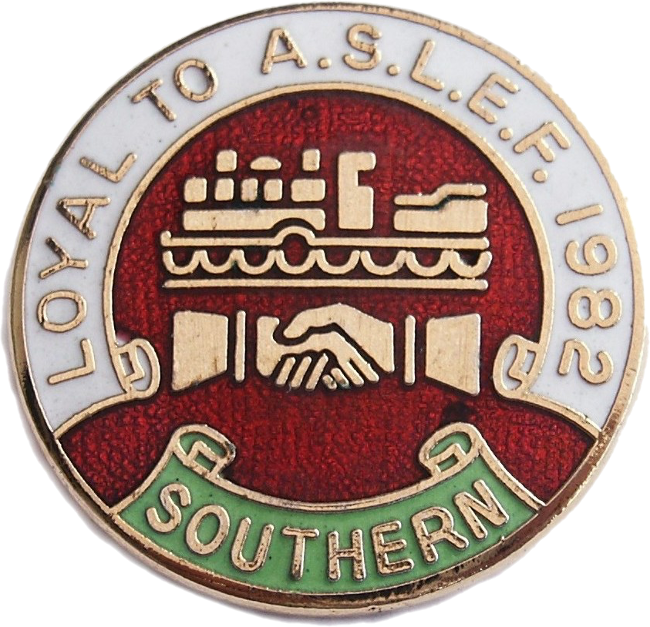
ALAN PENTNEY COLLECTION
The Southern Region 1982 strike badge
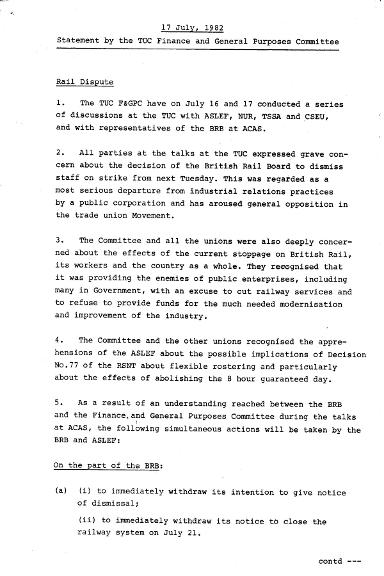
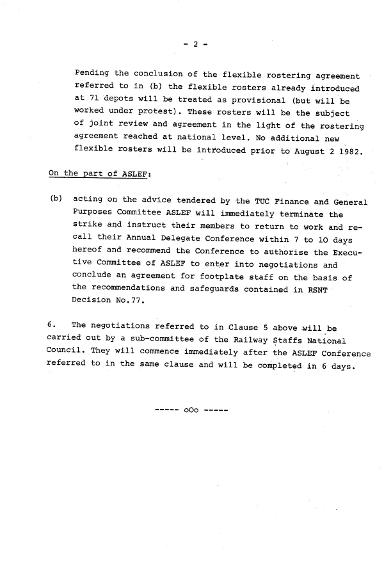
Ore Special Meeting
July 6th 1982
Commenced 3.18 close 4.08
Members present (21) Bros. S. Tingley, R. Taylor, D. Roberts, E. Spray, R.Chamberlain,
R. Scott, D. King, F. Jenner, A. Christian, P. Bowles, J. Newett, D. Rodgers, A. Arnold,
P. Hawkins, J. Gain, A. Thompson, J. Mould, E. Ball & L. Baldwin.
Correspondence was read out relating to the R.S.N.T. No. 77 and other letters relating to the present dispute. a discussion amongst the members followed. At the end of the this it was decided that a resolution be sent to Head
Office as follows.
"That this Branch fully supports the action of the E.C. but our members feel that every effort should be made to bring this dispute to an early conclusion with a satisfactory settlement."
This was proposed by Bro. J. Gain and seconded by Bro. R. Scott. voting for this proposal was 20 for with 1 abstention.
It was also agreed that the Secretary should write to the T.U.C. and also to the local branch of the T.G.W.U. complaining about the extra coaches being put on the road thereby having serious affect on our efforts to obtain a good settlement.
It was agreed that a meeting would be held at 3.p.m. on Monday 12th July 1982, assuming the strike was still on.
Meeting closed 4.08 p.m.
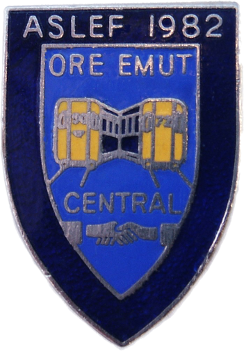
Ore Special Meeting
July 12th 1982
Commenced 3.15 close 4.05
Members present (19) Bros. S. Tingley, R. Taylor, D. Roberts, J. Newett, J. Hoath W. Arling,
E. Spray, R.Chamberlain, R. Scott, D. King, F. Jenner, A. Christian, R. Waghorne,
S. Spackman, D. Rodgers, A. Arnold, P. Hawkins, J. Gain, A. Thompson, J. Mould, E. Ball
& L. Baldwin.
Also present Branch Secretary St. Leonards Depot
Bro. J. Wallis & Bro. D. Kurse of St Leonards.
The minutes of the last special meeting were read, it was proposed by Bro. D. king and seconded by Bro. W. Arling.
That the minutes were read as a true record.
Latest correspondence was read at out and discussed, the question of the Hardship Fund money which had been sent down from Head Office was discussed. This amounted to £108, it was proposed by Bro. J. Gain and seconded by Bro. S. Tingley.
That this sum of money be kept for the time being.
This was voted on and everyone was unanimous.
Owing to the fact that a train have been taken out of the depot this morning the question of publicity was raised. After discussion it was felt that we would not picket the depot.
Other items discussed by members concerning the present dispute were pensions and also the question of dismissal notices which we understood were being prepared by management later to be issued to strikers.
It was agreed that we would meet again next Monday at 3 p.m., 19th July, 1982
Meeting closed 4.05 p.m.
Special Meeting July 16th 1982
Commenced 10.10 close 11.12
Members present (22) Bros. D. Roberts, A. Thompson, J. Gain, F. King, W. White, E. Spray,
R. Taylor, L. Baldwin, P. Bowles, A. Christian, W. Arling, J. Hoath, A. Arnold, R. Scott,
S. Spackman, D. Rodgers, R. Waghorne, J. Newett, E. Ball, S. Tingley, J. Mould,
& P. Hawkins.
Also present Branch Secretary St. Leonards Depot Bros. J. Wallis, E. Gates J. Norris, P. Bates & D. Kurse of St Leonards & Bro. E. Rensham of Tonbridge.
The latest correspondence was read out relating to the present dispute, also details of the numerous phone calls which the Secretary had received since our last meeting.
Minutes of the last Special Branch Meeting were read. It was proposed by Bro. J. Gain and seconded by Bro. S. Spackman. That the minutes were read as a true record.
Many members expressed their opinions on this stage of the dispute. Bro. E. Rensham of Tonbridge spoke on the details of the Branch Meeting held at Tunbridge and also of the general feeling of Tonbridge members.
After most members had expressed their views and concerns it was unanimously decided that we stand firm until our next Special Meeting which would be on Monday 19th July 1982, 3p.m.
It was proposed that the Secretary should contact Bro. A. Allen of Tunbridge Wells, our A.A.D. representative to see if he could give a talk about the D.H.S. to members. The St Leonards branch, were also invited to attend this meeting. It was agreed that the Secretary purchase some sellotape for his use.
Meeting closed 11.12.
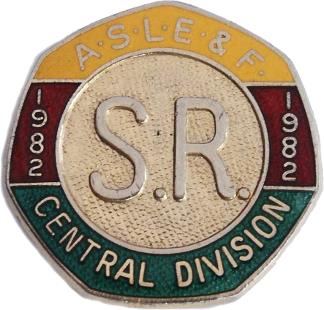
ALAN PENTNEY COLLECTION
The Central Division of the Southern Region 1982 strike badge
THE AFTERMATH OF THE STRIKE
It was on return to work of A.S.L.E.F. members that the true picture started to imerge of what
had taken place over the previous two weeks. Mess rooms across the country, which where
once fairly harmonious places, became a battle ground, between loyal members and those
members who decided to go back to work before the strike had been called off. In many cases
it was not the fact that a member had decided to return to work, but the fact that some had
worked a considerable amount of overtime. What made matters much worse was that some of
these Drivers then started to boast about how much they had earned at the expense of their
fellow colleagues who had stayed loyal and had lost 2 weeks pay with the resulting financial
hardship that entailed.
This would become such an issue that there is still animosity between Drivers that worked
and those that did not to this day.
With the introduction of the new method of rostering Brighton E.M.U.T. and M.T. Depots
Local Departmental Committee (L.D.C.) would have to agree their own rosters with the local
depot manager. The major changes to the way the roster was to be compiled was that the
roster would be sub-divided into an 8 week block with a minimum of 9 rest days and a
maximum of 312 hours to equate to the 39 hour week in each 8 week cycle. The diagrams
that Drivers would work to would consist of a variable length of between 7 - 9 hours. The
longer the turns the more rest days would be required to fit into the 8 week cycle.
At Brighton the E.M.U.T.and M.T. depots L.D.C.’s took a different stance on this issue. Whilst
other depots were still arguing over the pros and cons of the new rostering principles the
Brighton M.T. L.D.C. struck whilst the iron was hot a got an agreement to their roster The
Mixed Traction depot devised a method of rostering and became the first L.D.C. in the area
to get their roster agreed. Their roster contained a large amount (of grouped together)
rest days.
This roster showed a driver having up to 7 rest days (including a Sunday) rostered over a
weekend. The Local Depot Manager for Brighton was so pleased that he was able to sign off
the first roster within the Brighton area. But it was only later after Drivers started working to
this roster that Management realised that what had been agreed was not going to be such as
productive as management had hoped for.
The Brighton E.M.U.T. L.D.C. decided to produce a rolling roster whereby every eight weeks
the drivers would move from one 8 week block to another and then rotate around that 8 week
block before moving on to another. This would ensure that every driver would work 312
hours every 8 weeks. This method of rostering was to cause major problems amongst the
membership. It was sometime later that this roster was done away with (see branch minutes
below).
Flexible rostering was perused by British Rail management under the belief that footplate
staff would become more productive and reduce the amount of Drivers required to run the
train service. The harsh reality though was that the cost of flexible rostering became exactly
the opposite and very expensive.
This is because if a Driver had a spare turn (was not rostered to drive a train but was shown
only a booking on time and could be rostered to cover another driver if they were not
available for any reason). This spare turn was a certain length (i.e.8 hours).
If that Driver was then booked a duty that was shorter than the original hours (i.e. 7 hours)
they would only work the hours they had been booked but still paid for their original hours.
Also if a Driver was rostered a spare turn of 8 hours but had to work a diagram of 9 hours
they would be paid the overtime. Under the original agreement of the 8 hour day all
diagrams and spare turns were of the same length so this did not arise.
This method of rostering, all these years later is still the basis of how today’s drivers rosters
are produced with only variations between each company within the country.
During the strike, senior managers were approaching various railway workers of certain grades, regarding them to carry out various training to enable them becoming train drivers. It was the intention of the B.R.B. under the direction of the Government to close the railways down for about six months to enable this to be carried out.
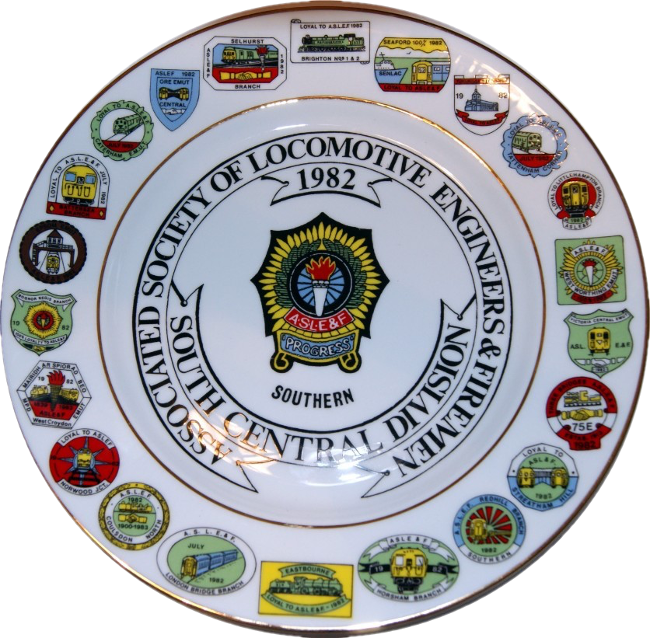
The South Central Division commemorative plate displays the individual A.S.L.E.F.
loyalty badges from the various A.S.L.E.F. Branches & Depots.
A number of Branches/Depots produced two badges (indicated in bold type),
one was for the loyal member and the second in a different colour was for general sale, to
help fund the cost of the making of the badge.
For example West Worthing E.M.U.T. depot had 24 loyal members (100%) and their
badge was made in black and the green badges (see below) was for general sale.
Therefore these types of Branch/Depot only badges are very hard to find
and they have become very sort after items by the various badge collectors.
The badges in clock wise order are: Brighton Nos.1&2 (Top), Seaford*,
Tunbridge Wells West*, Tatternham Corner, Littlehampton*, West Worthing*,
Victoria "C”, Three Bridges, Streatham Hill*, Redhill, Horsham,
Eastbourne (Bottom), London Bridge, Coulsdon North*, Norwood, West Croydon*,
Bognor Regis*, Epsom, Battersea, Catterham, Ore* & Selhurst.
* Branches/Depots now closed.
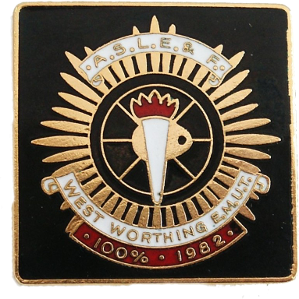
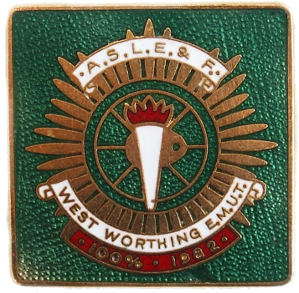
West Worthing A.S.L.E.&F. 1982 strike badges
Even though the A.S.L.E.F. members of West Worthing E.M.U.T. depot belonged to the
Brighton No.2 Branch, the depot proudly produced their own depot strike badge, which
indicates their depots' 100% loyalty to this historical strike by
A.S.L.E.F. This was something the A.S.L.E.F.'s members at West Worthing was proud to
boast.
Extracted and adapted from
Tunbridge Wells Meeting
Sunday 25th July 1982, 10.15 a.m.
at the Welfare Rooms Tunbridge Wells Central Station
The Chairman then moved on to letters/correspondence.
The Secretary went through letters sent and received in date order since May up to date as shown below one letter that the Secretary had received only a few days earlier was from Waterloo Branch which was about the A.A.D. which asked member to vote and support their resolution on getting A.S.L.E.F. membership from the T.U.C. withdrawn. Bro. M. Allen asked that no motion or mandate be taken because as he had experienced from the last A.A.D. when discussion gets under ways that do get said that could change the argument and if he had a mandate from this branch he would not be able to put across the best intention for the society.
Bro R. Plummer withdrawing membership, Bro. G. Brown explaining why he went to work and a letter from Bro. R. Harris on strike action and also asked that this go forward to the Loco journal.
After the letter had been read it was proposed by Bro. J. Carney and seconded by Bro. M. Allen.
That the contents of Bro. R. Harris letter be sent to Head Office for insertion in the Loco Journal as branch members report.
All in favour.
Then the Chairman asked for any matter arising as their were none he moved on to district Council report. Bro. M. Allen mentioned that due to the strike the last District Council had been cancelled. The Chairman then asked for any matters arising from the District Council Report.
Then he moved on to any motion and amendments the Chairman said he had one and asked if he could leave the Chair while he spoke, he then asked that we complain about the N.U.R. Secretary with the way he acted during the strike and while talks were going on. He then proposed and seconded by Bro. A. Herriott.
That the Secretary write to the E.C. complaining about the attitude of the General Secretary of the N.U.R. and the open views he took through television and the media alike, totally neglecting his responsibilities as a fellow trade unionist. This we ask the E.C. to forward to the T.U.C. for their action.
All in favour.
The Chairman then moved on to L.D.C. Report.
Bro. G. Brown’s letter had been sent to him asking him to resign as L.D.C. Chairman and the L.D.C. because he worked during the strikes and a reply from him with his resignation in it.
So now there was a vacancy on the L.D.C. Bro. A. Herriott made it known that he would be interested in the L.D.C. it was then proposed by Bro. F. Diplock and seconded by Bro. M. Allen. That this Branch excepts Bro. G. Brown resignation and puts Bro. A. Herriott forward on to the L.D.C. of Tunbridge Wells West. All in favour.
Extracted and adapted from
Tunbridge Wells Meeting
Sunday 18th September 1982
at the Welfare Rooms Tunbridge Wells Central Station
On matter arising from the minutes the question was asked on what was happening to those members who did attend work during the two week all out strike. The Secretary informed the members that he had written to Head Office on 22nd July, 1982, over this and had written a chasing letter on 13th August 1982 and had to date received an acknowledgement dated 27th July 1982 and a letter dated 29th July 1982 informing us that the E.C. has yet to deal with this item.
It was then proposed by Bro. M. Allen and seconded by Bro. L. Stephenson.
That the Secretary be instructed to write again to Head Office over those member who did work through the strike.
All in favour.
The District Council (August ?) have been instructed that strike badges will have to be issued, but members will be asked to pay for these, something like the men at Hastings have done (approximately 50% of St. Leonards Depot did not strike)
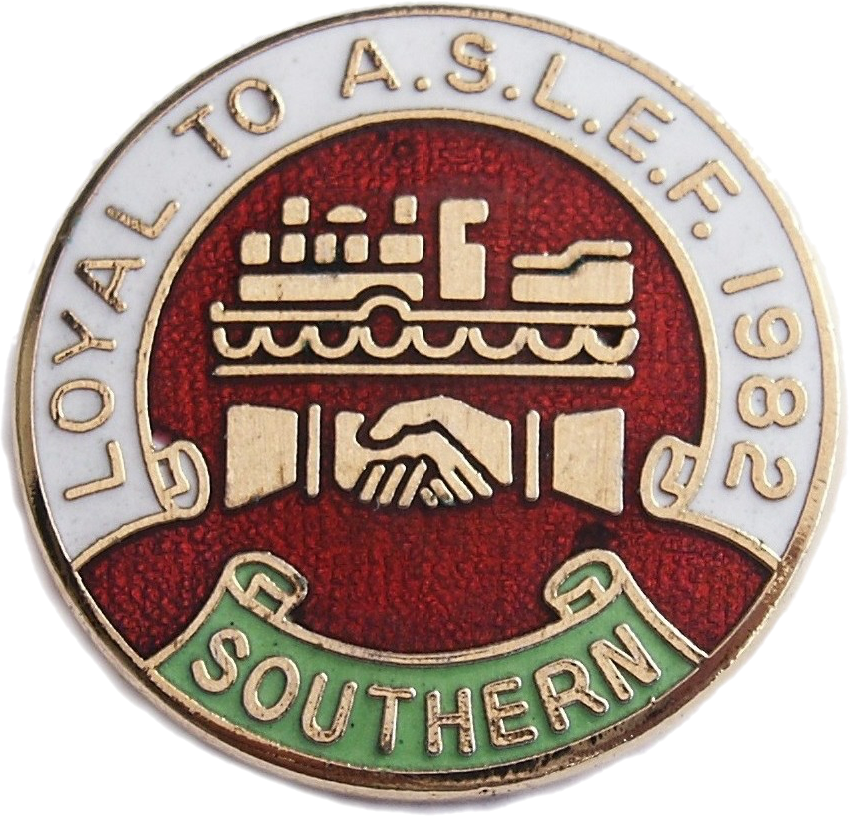
ALAN PENTNEY COLLECTION
The Southern Region 1982 strike badge
Tunbridge Wells Meeting
Sunday 16th October 1982
at the Welfare Rooms Tunbridge Wells Central Stati
ASLEF Strike badges, these are being made by Bro. D. Bush of Slade’s Green, and this branch has ordered 50 and these will be on sale at 80p each, then Bro. M. Allen asked if the branch would allow the Secretary to pay for these badges from branch funds and they on selling them re inburst the Branch’s accounts it was moved by Bro. M. Allen and seconded by Bro. F. Diplock.
That the Secretary be instructed to get in contact with Bro. D. Bush and pay him £40.00 from Branch funds for 50 A.S.L.E.F. loyalty badges.
All in favour.
At the November the Branch Secretary mentioned London Bridge have been subsidising their badges from Branch Funds. Moved by Bro. F. Diplock and seconded by Bro. M. Allen.
“That the Tunbridge Wells Branch subsides the loyalty badges requested by members of the Tunbridge Wells Branch by 30p each badge. Not extra badges."
Carried.
Moved by Bro. M. Allen and seconded by Bro. F. Diplock.
"That the Secretary write to D. Bush of Slade’s Green Branch, who ordered and distributed the badges, to thank him for what he has done."
Carried.
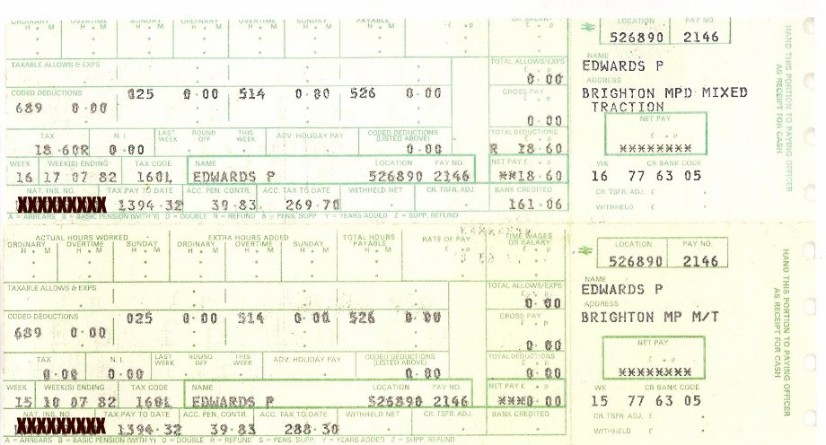
PAUL EDWARDS COLLECTION
Pay slips reflecting the two weeks of the 1982 strike